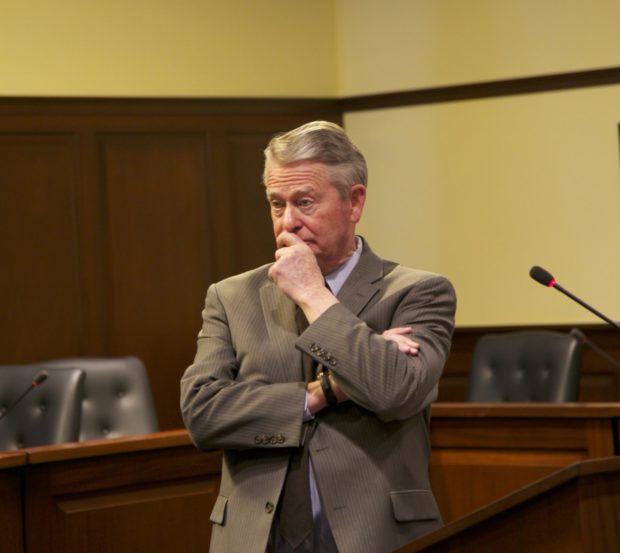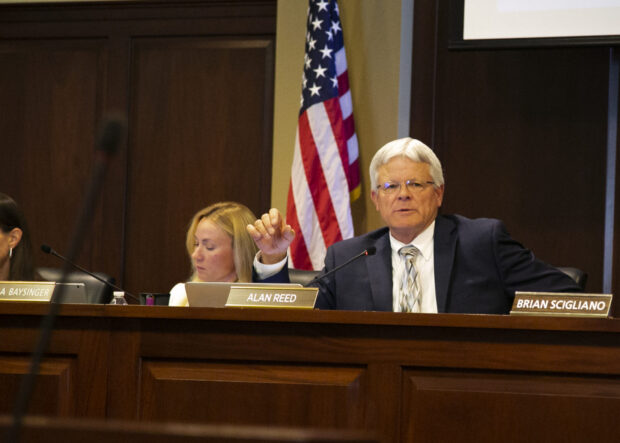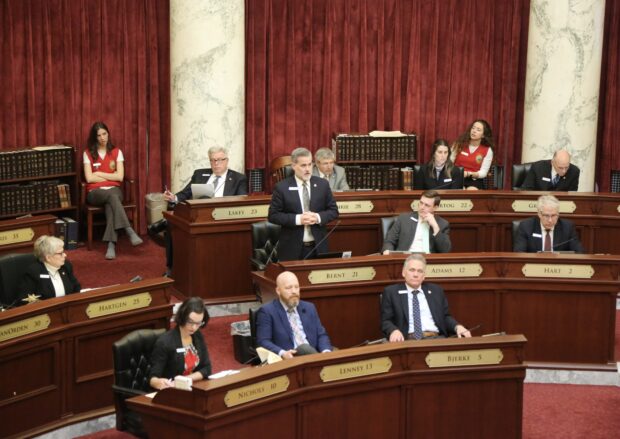The Idaho Public Charter School Commission is at a crossroads, unable to manage growth with its staff, and undermined by conflicting directives coming from the governor and the Legislature.
Exactly what the commission’s role is as a statewide authorizer — a regulatory agency or supportive charter advocate — has led to adversarial hearings, resignations and unmet expectations.
And help is not on the way.

In a rare move, the Senate this week rejected Gov. Brad Little’s appointment to the commission’s board, Karen Echeverria. The longtime Idaho education leader was a vocal advocate for financial and academic accountability. At recent charter renewal hearings, she consistently offered motions to either close underperforming schools or hold them accountable to state compliance rules.
In leading the campaign against the appointment, Sen. Lori Den Hartog said she has “a lot of respect” for Echeverria. But Den Hartog, R-Meridian, said she wants to see a commission that balances both advocacy and regulation equally.
The Legislature also denied the commission’s request for $96,700 to fund another staffer, which was supported by the governor. Rep. Wendy Horman opposed the request because that would increase charter school regulation.
The governor now has two appointments to make, following the abrupt resignation of commissioner Brian Scigliano and the Senate’s denial of Echeverria. And the board is on the search for a new director, after Jenn Thompson resigned in frustration over the commission’s decision to exempt one school from financial oversight.
The coming months the commission will at least see new leaders and possibly a transformation as the charter movement and parental choice in Idaho gain momentum.

“The goal is to become better, and find ways to do that,” said chairman Alan Reed. “(Little) would like us to be a little more proactive, to make sure that the schools don’t get into financial trouble — watch them a little closer and provide some support there and help to keep them out of problems.”
But more top-down governance is not the right solution, according to the leadership of Idaho’s largest virtual school.
The creation of Idaho’s charter commission “was not about creating another regulatory agency,” said Kelly Edginton, executive director of Idaho Virtual Academy. “Every school is different. I think it’s about approaching each charter as an individual and unique school, rather than using a one-size-fits-all approach.”
Reed agrees it’s time for improvement and that commissioners can learn from everyone. “At this point, gather up the best ideas and information we can, and strive to move forward as a better commission and a better support for the schools.”
The recent fallout
The commission’s recent governance struggles were exposed in February, during renewal meetings for Peace Valley Charter School, Monticello Montessori Charter School and IDVA.
IDVA’s renewal hearing sparked a cascade of resignations within the commission’s leadership. The virtual school was granted an exemption that precludes the school from having to report certain finances.
The school argued that the commission’s financial metrics — its rubric — is not a fit for schools with a deficit protection clause.
The Legislature has subsequently passed legislation to clarify this issue. House Bill 113 clarifies that contracts between third-party vendors and charters should be considered favorably if they result in the vendor forgiving a charter’s debt — the “deficit protection clause” — if the charter is unable to pay it back. The legislation is awaiting Little’s approval.
“Our board felt it had no choice but to contest the renewal because of the many errors and inaccurate analysis. This could have been avoided had the process been more cooperative and collaborative from the start,” Edginton said.
“Yes, there was definitely a list of challenges there that (IDVA) brought forward. As a commission, we’re going to want to make sure that we don’t have mistakes on annual reports, so I think there’s some things that came up that we need to help the (staff) with,” Reed said.
In the days after the meeting, Scigliano and Thompson resigned because the commission did not follow state regulations and abdicated its responsibility to taxpayers.
Reed said, “They chose to resign over that, and it’s too bad that they did, because the Legislature essentially has solved that problem for us.”
Idaho’s uncommon funding practice
The Legislature’s unorthodox funding method for the commission puts it at a disadvantage for evaluating and supporting its growing number of public charter schools, according to a weeks-long investigation by Idaho Education News.
The Legislature created the commission in 2004 to provide oversight for public charter schools. The commission’s seven board members are volunteers, appointed by the governor and the Legislature.
In 2013, the commission authorized 33 schools and had a staff of 2 1/2 paid positions. Today, the commission is responsible for 70 schools, $244 million and 29,000 students.
The Legislature appropriates a set amount each year. Comparatively, the more common funding method in other states is for the charter oversight organization to receive a percentage of per-pupil funding for each school the authorizer oversees, which keeps the staff in pace with charter school and student growth.
As new schools are added with additional student seats, this formula provides authorizers with increased resources alongside that growth, according to the National Association of Charter School Authorizers (NACSA).
“And it usually ranges anywhere between 1% and 3%,” explained Karega Rausch, president and CEO of NACSA, an Illinois-based nonprofit that helps authorizers adopt best practices.
“So if I’m an authorizer overseeing five schools that have a total of 10,000 students, and let’s say for example, they’re funded … $10,000 per student, the authorizer will get between 1% and 3% of that revenue for their oversight activities,” Rausch said.
If applied to Idaho, the national funding formula would more than double its budget.
In the current fiscal year, Idaho’s commission was provided a budget of approximately $678,300. Utah’s is $1.9 million and Colorado’s is $5.7 million.
Once Idaho’s Legislature determines an appropriation amount (for fiscal year 2023 that amount increased to $728,900) a formula is then used to determine the proportionate share each school pays. For example, if $100 is appropriated, and there are 100 schools, each school pays $1. The formula reduces fees to account for school size.
Five staff members manage a growing portfolio of schools
Idaho’s commission had plans to grow by three new staff members over the next two years, according to documents obtained by EdNews. But the 2023 Legislature denied a request for just one additional staff member.
In the last five years, Idaho added nearly 11,500 new charter school seats and 28 schools were opened or approved.
Steve Canavero, a director at WestEd, a nonpartisan research, development and service agency based in California, said it would be challenging in Idaho to maintain all of their responsibilities with a staff of five. An authorizer’s staff is both a critical partner with schools of high standards and a protector of the public trust, he said.
The commission is paid very little attention until it has to deal with a troubled school or “when they are dealing with a really tough situation that has no really good answers,” said Bluum CEO Terry Ryan.
“They are like lawyers, accountants or ministers, in that you don’t know how bad you need them until you are in trouble,” Ryan said.
Idaho’s staff of five works under a 14-to-1 ratio, one staff member for every 14 schools. By comparison, the Utah State Charter School Board’s staff of 11 manages 126 schools — 11.5-to-1 ratio. And in Colorado, the Colorado Charter School Institute’s staff of 35 manages 43 schools — 1.2-to-1 ratio, according to NACSA and Idaho’s charter commission.
Idaho’s staff of two portfolio managers, one financial manager, one office specialist and one director places Idaho at or near the bottom nationally of the staff-to-school ratio, according to the national charter school report.
While Reed thinks Idaho’s authorizing staff understands their duties and responsibilities well, he also said “we all need more” training opportunities because it’s “our goal to learn and be better in what our responsibilities are.
Leveraging the knowledge and experience of national experts
The staff needs more training but they don’t have the time or money to get it — and Reed doesn’t want to partner with NACSA because it is highly regulatory. Utah and Colorado work closely with NACSA.
“We have to be careful with some of those organizations that we continue to operate the way we want to here in Idaho,” Reed said.
NACSA is an organization that’s focused exclusively on trying to improve authorizing through its network of more than 200 nationwide authorizers who educate 2.5 million students — or about 66% of all charter schools across the country.
But developing a stronger relationship with NACSA has been avoided by the commission’s leadership.
“NACSA has a little different approach,” Reed said.
Reed believes “there’s probably some things we can learn from them,” but he is not ready to embrace their style, because he is adamant about striking the right balance between autonomy and oversight.
What’s next?
The commission appointed portfolio manager Melissa-Jo Rivera as interim director and Reed said the search for a new director is under way.
The governor has two appointments to make and his office did not provide a timeline on Thursday.
“We’ve got to have that conversation with everybody that we had some mistakes. We just need a kind of a mastermind session to determine what we need to do better,” Reed said.
Thompson’s last day on the job is Thursday. She was not available for comment.
Reed said, “So we’ve got some work to do to help (the Legislature) understand the governor’s vision.”

